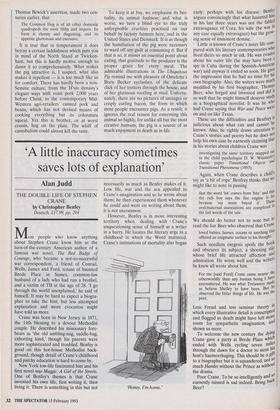`A little inaccuracy sometimes saves lots of explanation'
Alan Judd
THE DOUBLE LIFE OF STEPHEN CRANE by Christopher Benfey Deutsch, £17.99, pp. 294 Most people who know anything about Stephen Crane know him as the turn-of-the-century American author of a famous war novel, The Red Badge of Courage, who became a not-so-successful war correspondent, a friend of Conrad, Wells, James and Ford, tenant of haunted Brede Place in Sussex, common-law husband of a lady who had run a brothel, and a victim of TB at the age of 28. 'I go through the world unexplained,' he said of himself. It may be hard to expect a biogra- pher to take the hint, but less attempted explanation and more evocation might have told us more.
Crane was born in New Jersey in 1871, the 14th blessing to a devout Methodist couple. He described his missionary fore- bears as 'the old ambling-nag, saddle-bag, exhorting kind,' though his parents were more sophisticated and troubled. Benfey is good on this hot-house Methodist back- ground, though detail of Crane's childhood and patchy education is hard to come by.
New York low-life fascinated him and his first novel was Maggie: A Girl of the Streets. One of Benfey's themes is that Crane invented his own life, first writing it, then living it. There is something in this but not necessarily as much as Benfey makes of it. Low life, war and the sea appealed to Crane's imagination and so he wrote about them; he then experienced them whenever he could and went on writing about them; it is not uncommon.
However, Benfey is in more interesting territory when dealing with • Crane's unquestioning sense of himself as a writer in a hurry. He locates the literary urge in a childhood in which the Word mattered. Crane's intimations of mortality also began Honey, I'm home.' early, perhaps with his disease. Benfey argues convincingly that what haunted him in his last three years was not the fabled extravagance of Cora, his wife (he was 10 any case equally extravagant) but the grow- ing sense of imminent demise. Little is known of Crane's inner life com- pared with his literary contemporaries who lived theirs so much in ink. He was evasive about his outer life (he may have been a spy in Cuba during the Spanish-American war) and anyway it ended so soon. He gave the impression that he had no time for his own biography. Also, the waters were much muddied by his first biographer, Thomas Beer, who forged and invented and did it so well that he might himself deserve studY as a biographical novelist. It was he who had Crane saying that War and Peace weal on and on like Texas. These are the difficulties and Benfrey is judicious about what can and cannot he known. Also, he rightly draws attention to Crane's stories and poetry but he does not help his own case by earnestly claiming that in his stories about children Crane was investigating the same territory mapped out in the child psychologist D. W. Winnicott classic paper Transitional Objects an° Transitional Phenomena (1953).
Again, when Crane describes a child's toy as 'a bit of rope' Benfrey thinks that we might like to note in passing
that the word 'bit' comes from 'bite' and that the rich boy says the fire engine is his because 'my mum buyed it'. These
. oral/maternal associations are completed al the last words of the tale.
We should do better not to note but to read the liar Beer who observed that Crane loved babies, horses, oceans or anything that offered an enigmatic surface to his thought. Such needless exegesis spoils the book and obscures its subject, a shooting siar, whose brief life attracted affection and admiration. He wrote well and the writers he knew all wrote about him.
For me [said Ford] Crane came nearer the otherworldly than any human being I have encountered. He was what Trelawney made us believe Shelley to have been. But he observed the littler things of life. He was the poet.
Less Freud and less seminar theory in which every illustrative detail is conscripted and flogged to death might have left more room for sympathetic imagination, and shown us more.
To welcome the new century the dying Crane gave a party at Brede Place which ended with Wells cycling seven miles through the dawn for a doctor to stem his host's haemorrhaging. This should be a gift to a biographer but it is squandered; not so much Hamlet without the Prince as without the drama.
Poor Crane. To be so intelligently and s° earnestly missed is sad indeed. Bring back Beer?


















































 Previous page
Previous page